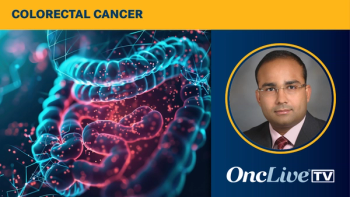
Neoadjuvant/Adjuvant Approaches in Colorectal Cancer
Transcript:John Marshall, MD: Multidisciplinary, we’ve got to identify it. Johanna, maybe talk a little bit about strategy. Do you give preoperative chemotherapy? What are the pros and cons to that? Let’s at least get us to surgery. So, surgery right away versus pre-operative chemotherapy.
Johanna Bendell, MD: It’s a debate, and there’s no wrong answer here. So, if you’ve got somebody who you could—and I hate using this word, but one of my mentors used to use it—“chip-shot” surgery with the liver disease, where it’s very quick to get that tumor out, it’s small enough, and you think the cure rate is going to be good, I’ll send those patients often times to surgery right away. The issue becomes more of is it helpful to know that your tumor responds to chemotherapy before you take them to the operating room, so adjuvantly, you know what you’re doing. And I think that there’s some benefit to that as well. But, I think there’s also the issue that you could shrink the tumor so much that you can’t find it anymore, and we’ve all had those patients where it did so well that we had to wait for the tumor to grow back. And there’s nothing that’s more stressful on a patient than knowing they’ve had this potentially curable disease and you’re waiting for their tumor to grow. I think that if it’s a very easy surgery for me personally, I’ll just go ahead and have them take it out, but otherwise, I’ll use very little preoperative chemotherapy—only about 2 months’ worth—before I re-stage them and get them to the operating room.
John Marshall, MD: Tony, what about PET scans, fancy MRIs, to make sure you’re seeing all the little stuff that you can see?
Tanios Bekaii-Saab, MD: We do use MRIs, with Eovist specifically, and that actually provides the surgeon with what they need to look at for resectability.
John Marshall, MD: But, they’re starting to learn this, too. So, not just a regular outside CT. They want the best imaging, so that we can find those little ditzels, right?
Tanios Bekaii-Saab, MD: Yes, absolutely. And you have to have a good mapping of the liver. The PET scan’s role is controversial. I actually tend to favor doing it just to rule out any other metastatic disease.
John Marshall, MD: A 1 cm, warm mediastinal lymph node, you going to operate on the patient?
Tanios Bekaii-Saab, MD: This is where you use your clinical judgment. Often times, there have been studies in the past that did suggest that you ultimately have about 20% of the patients who would essentially avoid unnecessary surgery. It probably is less than that, frankly. But, I think the PET scan is really not as important. You use this judiciously, but the most important thing is to get a good mapping of the liver and a good view, and an MRI with the Eovist would probably make the most sense.
John Marshall, MD: We may not agree on this, but what about preoperative biologics?
Alan P. Venook, MD: One other word about the PET scan. I would say that the PET/CT scan, which is often a community test, in general is a useless test because it’s almost always done with IV contrast for the CT. So, you get a meaningless CT scan, which really doesn’t help us. And one of our struggles, always, is getting the insurance to agree to do a subsequent scan, which is what we really need to make the right decision. In terms of biologics, well, the issue of the EGFR antibodies has been looked at. In fact, the classic study, new EPIC, showed no benefit detriment to the EGFR antibody.
John Marshall, MD: It makes no sense either, right?
Alan P. Venook, MD: Unless they had all right-sided patients.
John Marshall, MD: But, they had a good response, right? Good response, good resection?
Alan P. Venook, MD: They did. That is contrary to common sense. Personally, if I had a patient who is resectable at the get-go, but I elected to do 4 cycles of upfront chemotherapy, I do not use a biologic. And the reason is if the risk is 1 in 25 that there will be a major complication to bevacizumab, for example, if your patient has a stroke or has some major event, you may miss the opportunity to cure them. Bevacizumab does not change the course of the disease that dramatically in 4 cycles, so I typically do not use a biologic if I believe a patient really is curable right off the bat. If you need a mega response, if you think it’s going to take more than 4 cycles, I may very well suggest using a biologic.
John Marshall, MD: For mega response needed, what am I giving? What do you want to give?
Johanna Bendell, MD: For mega response needed, probably FOLFOXIRI, and I’d do bevacizumab.
John Marshall, MD: I would do bevacizumab in that situation.
Alan P. Venook, MD: Although if you look at TRIBE study, FOLFOXIRI/bevacizumab did not increase the likelihood of R0 resection of liver metastases, at least in their analysis. But, I agree with you. In fact, in our experience, I have yet to see a patient who didn’t respond to FOLFOXIRI. It is incredibly active chemotherapy. And so, I do think we’re using much more of that than we used to in the past.
John Marshall, MD: Everybody okay with that? So, decision making based on the patient in front of you, avoid the risk, and you want to see a response. But, let’s go back to that case. I think this is the hardest patient. At the patient’s surgery, they find a 1 cm liver lesion and they remove it. And so, they now come to you, stage IV no evidence of disease (NED), and let me make it 10 positive lymph nodes and this 1-liver lesion. What’s the postoperative therapy?
Johanna Bendell, MD: It’s 6 months of FOLFOX.
John Marshall, MD: So, just straight adjuvant. Biologic in this setting?
Alan P. Venook, MD: No.
John Marshall, MD: Tony?
Tanios Bekaii-Saab, MD: No biologic.
John Marshall, MD: Okay. High-risk though. This patient is in some trouble and has just the role of adjuvant therapy. The magic 6 months, but, really, do I have to give 6 months?
Alan P. Venook, MD: You do until proven otherwise.
John Marshall, MD: Really?
Alan P. Venook, MD: We will have. Whether you can extrapolate to the stage IV NED patient is a question, but we expect, in the next 1 to 2 months, to have the results of a pooled analysis of 7 studies looking at 12 versus 6 cycles of FOLFOX in the adjuvant setting—if those were not indifferent, not different. Then, I think 6 cycles might be enough for the stage III patient. Whether that applies for the stage IV NED patient, I don’t know.
Tanios Bekaii-Saab, MD: In fact, I would actually argue for less in this particular patient. This is almost 100% risk of recurrence. I would say that you can argue that no chemotherapy is also acceptable. So, 3-month FOLFOX or even a straight 5-FU or capecitabine would be just fine.
John Marshall, MD: I got an email just last week of some doctor asking me about a patient who had adjuvant therapy a year-and-a-half ago and now has an isolated liver lesion that has been removed. Anybody giving FOLFIRI for the heck of it?
Alan P. Venook, MD: That’s a good question. That’s also a guess. I think if you’re a year-and-a-half or so out, I probably wouldn’t. If it’s 6 months or 3 months, I might.
John Marshall, MD: Adjuvant FOLFIRI?
Alan P. Venook, MD: I probably would do neoadjuvant FOLFIRI in that case, but I think the answer is, of course, that FOLFIRI has been looked at in numerous studies. It does not work as an adjuvant.
John Marshall, MD: It doesn’t have an adjuvant effect, right?
Alan P. Venook, MD: Correct.
John Marshall, MD: Others thoughts? Leave them alone?
Tanios Bekaii-Saab, MD: I’d leave them. I’d leave this patient alone or, as Alan said, depending on the situation, maybe treat them as metastatic disease for a limited amount of time. But, my gut feeling would be, for this patient, just to observe.
John Marshall, MD: Any difference?
Johanna Bendell, MD: A year-and-a-half out if the patient pushed for it, I might try some adjuvant therapy, but be quick to decrease it if you have any toxicity from it.
Transcript Edited for Clarity



































